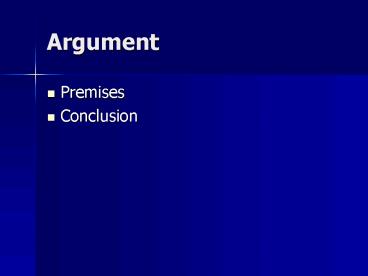Argument - PowerPoint PPT Presentation
1 / 9
Title: Argument
1
Argument
- Premises
- Conclusion
2
Conclusion Indicators
- Thus
- Therefore
- Hence
- This shows that
- This suggests that
- Consequently
- So
- Accordingly
- This implies that
- This proves that
3
Premise Indicators
- Since
- Because
- For
- In view of
- This is implied by
4
Arguments
- Good Justifies acceptance of the conclusion
- Valid If the premises are true, the conclusion
must be true - Sound All premises are true
- Strong Unlikely that if the premises are true
the conclusion is false
5
Arguments,
- Deductive An argument that is either valid or
intended by its author to be so. - Inductive An invalid argument whose premises are
intended to provide some support, but less than
conclusive support, for the conclusion.
6
Deductive Reasoning
- Generally described as moving from general
principles to particular phenomena. - In a simple-minded example, knowing the existence
of gravity makes one able to predict the likely
direction of movement of any unsupported object
in a gravitational field. - In a practical (but related) example, having
observed the direction of movement of a number of
unsupported objects on the surface of the Earth
makes it easy to predict the movement of any
other unsupported objects under similar
conditions (things fall down--a thing will fall
down when dropped). - Knowing that public buildings contain, among
other things, drinking fountains and telephone
booths (general principles) one may confidently
expect to satisfy the need for such amenities
based on the likely prediction of finding either
in a given building (a particular phenomenon).
7
Examples of Deductive Reasoning
- Deductive reasoning (or deduction) is the way in
which the human adult survives. - We do not walk into a public street without
looking for cars any more than one of our
prehistoric ancestors would walk into the den of
a cave bear without checking for occupancy. - We match our immediate experience with our armory
of general principles about the way the world
works and satisfy ourselves that we are in no
danger. - We also use this technique to find the resources
needed to keep us alive. Having general ideas
about where food is found (whether in a tree or
in a market) enables the prediction of its
specific locations thereby helping to ensure
survival.
8
Inductive Reasoning
- Generally described as moving from particulars to
general principles. - How many times do we find food under a certain
kind of rock or in a certain type of tree before
we begin to realize that food ought to be sought
there? - The generalizations that food can be found under
white rocks or in slender trees with peeling bark
are derived by inductive reasoning. - Induction is the natural work of a small child
("You can't teach an old dog new tricks."). - An important function of a complex environment is
to provide the child with experiences needed to
induce the generalizations required for a
successful life. - Knowledgeable parents gauge toys and experiences
to the developmental level and temperament of the
child. It is the constant knowledge and fear that
induction is yet imperfect that leads parents to
restrict the explorations of young children to
"safe" activities ("Be home before midnight!") - Bad judgment can lead to survival failure.
9
More Inductive Reasoning
- Deduction, then, is the reward of induction.
- As we mature, we gain the ability to filter our
perceptions and experiences through a complex web
of conventional, induced notions about the causes
and consequences of a vast array of daily
phenomena. - We use the predictions made by deductive
reasoning for countless small decisions in the
conduct of our lives. - "Is it safe to cross the street?" "Is that noise
in the basement the cat or an intruder?" "How
will my boss respond to my request for a leave
day?" "Will this log across the stream support my
weight?" "Will I be able to stop the car in
time?" - All such questions are best answered by deduction
based on existing, induced principles. In other
words, by using good judgment. - In a "natural" human habitat induction is
practiced mainly by children. It is the rare
adult who discovers something truly new (they are
content with what they learnt). - The ability that children have to look at
ordinary things in fresh ways leads us to remark
about the "innocence of children" and the "joy of
simple discovery" characteristic of the way a
child looks at the (mundane, dirty old) world. - Unfortunately, this inquisitive inductive phase
of human development is usually cut short by
imposed educational philosophies which, by
turning the favored generalizations of
high-ranking educators into dogma, stifle
creative exploration.































